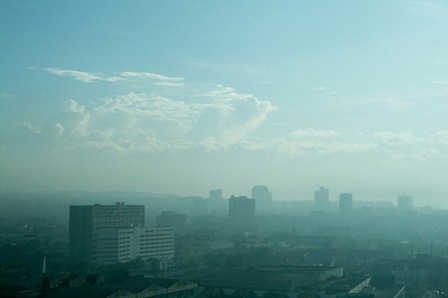For the youngest and oldest, air pollution may have serious health consequences
The effect of air pollution on climate change is well-documented, but two new studies show that it may also pose surprising dangers to public health
On Wednesday, California Governor Jerry Brown announced an ambitious plan to reduce the state’s carbon emissions. His proposal – which would cut emissions by 40% below 1990 levels within the next 15 years – is aimed at curbing the potentially catastrophic effects of global warming, such as rising sea levels and super droughts. But while air pollution is bad for the planet, two studies released this week show that it’s also having a detrimental effect on public health.
One report, released on Wednesday, studied the impact of air pollution on fetal development. Researchers found that women who were in their final stage of pregnancy during the 2008 Beijing Summer Olympics – when China drastically cut down on air pollution – gave birth to heavier babies than those born during the same period a year earlier or later.
According to the study, babies of women who were in their eighth month of pregnancy during the event, which was held in August 2008, were – on average – 23 grams larger at birth compared to those born in 2007 and 2009. There weren’t any significant differences in weight for babies of women who were in their first seven months of pregnancy during the games.
The study credits cleaner air for the bump. Beijing, which the study’s authors described as “one of the most heavily polluted cities in the world”, was forced to combat air pollution as a condition for hosting the Olympics. The city temporarily closed down factories, halted construction, and reduced the number of cars on the road. As a result, air pollutants like nitrogen dioxide and sulfate decreased between 18% and 59% during the 47 days of the games, the report found.
“The results of this study demonstrate a clear association between changes in air pollutant concentrations and birth weight,” David Q Rich, an epidemiologist with the University of Rochester Medical Center and lead author of the study, said in a statement. “These findings not only illustrate one of the many significant health consequences of pollution, but also demonstrate that this phenomenon can be reversed.”
But smog isn’t just putting society’s youngest members at risk: another study has found that long term exposure to air pollution can lead to premature ageing of the brain.
The report, published in the May issue of Stroke, analyzed data on 943 men and women over the age of 60. It found that those exposed to a form of pollution called PM 2.5 – a fine particulate matter that enters the lungs and blood – had smaller total cerebral brain volume, a sign of brain atrophy. People naturally lose cerebral brain volume as they get older, but these findings indicate that air pollution may speed up the process.
“The results suggest that exposures to air pollution may be associated with subtle but potentially harmful effects on the aging brain,” said Elissa H Wilker, the study’s lead author, and a researcher at Boston’s Beth Israel Deaconess Medical Center.
Wilker added that more studies are needed to investigate the effects of long term exposure to air pollution over time. But with 3 million deaths worldwide each year attributed to air pollution, Jerry Brown’s push to reduce carbon emissions is more pressing than ever.
Related Posts

